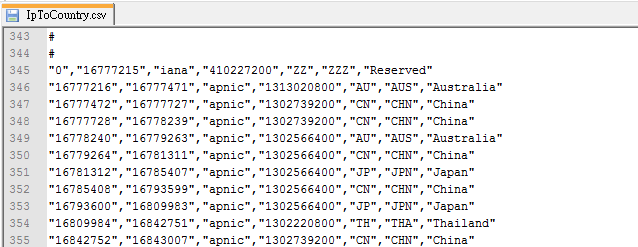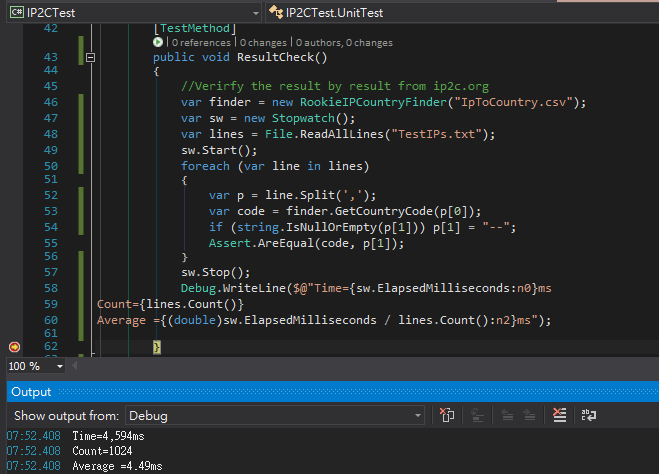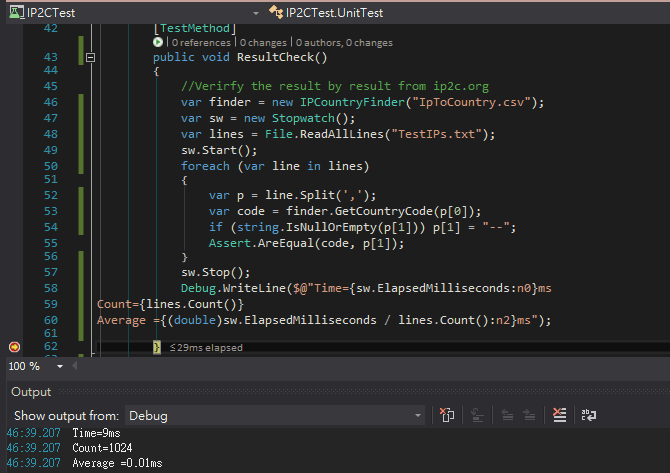講到由 IP 地址查詢所屬國家,解決方案有兩種:第一種是直接呼叫線上查詢 API(付費或免費),再不然就要下載 IP 區段資料庫自寫查詢程式。考量應用場合不一定有 Internet 連線能力,加上擔心線上 API 無法滿足 IIS Log 等超大量 IP 解析的效能要求,選擇取回資料檔自幹。(其實是因為這題目大小難易適中,十分適合練功,一時手癢難耐,就…)
爬文找到一些 IP 國別對應資料來源:
- Maxmind GeoIP2 https://www.maxmind.com/en/geoip2-country-database
Maxmind 在 Stackoverflow 受到不少網友推薦。精準度高(99.8%),另有對應到城市、ISP的版本,甚至有準確率分析報告,十分專業,授權費用每個站台 $50。 - Maxmind GeoLite2 http://dev.maxmind.com/geoip/legacy/geolite/
GeoIP2 的免費版,格式較舊,精確度不如 GeoIP2,使用時需註明來源連結(CC-BY-SA 授權)。 - IPInfoDB LITE版 http://ipinfodb.com/ip_database.php
提供 CSV 資料庫下載,查詢準確率>98%,使用時需於網站加註連結(CC-BY-SA 授權)。 - ip2c.org http://www.ip2c.org/
免費(LGPL授權)且無使用量限制的 API 服務,精準率(99.95%),GET httq://ip2c.org/XXX.XXX.XXX.XXX 直接拿結果,乾淨俐落,是 API 服務的首選,但未提供資料庫下載。 - software77 http://software77.net/geo-ip/
ip2c.org 的資料來源,每 24 小時更新,有 CSV 可下載,為捐款軟體(Donationware,自由捐獻)。 - ip2nation.com http://www.ip2nation.com/ip2nation
完全免費且無限制,直接提供 MySQL Script 方便匯入資料表進行查詢,精準率約 98-99%。
最後決定選用 software77 的資料,看中它每日更新以及號稱 99.95% 的準確率。(各家資料格式大同小異,要更換來源並非難事,微調匯入邏輯即可)
由網站取回 IpToContry.csv 格式如下,前方有一大段註解直接略過即可。資料部分共有七欄,第1、2欄為 IP 區段的起始位址及結束位址(IP 位址不使用 aaa.bbb.ccc.ddd 字串格式,而是將四個 Byte 轉換為整數),第 5 欄為國別代碼,第 7 欄有國家名稱。

一般處理 IP 區段查詢,最常見做法是轉進資料庫後使用 SQL 查詢。評估資料筆數大約 17 萬筆,轉成物件陣列放進記憶體進行查詢對 C# 及當代電腦硬體是一碟小菜,不依賴資料庫的輕巧小程式更貼近我的開發哲學,用一個小類別打死才帥。
先不費太多腦力,用最直覺的 C# LINQ 來解:定義一個範圍物件 IPRange,屬性包含起始位址、結束位址、國別代碼、國家名稱。將資料檔轉為 List<IPRange>,查詢用 .SingleOrDefault(o => ip >= o.Start && ip <= o.End) 就能輕鬆達成, 50 行搞定:
using System;using System.Collections.Generic;using System.IO;using System.Linq;using System.Net;namespace IP2C.Net{publicclass RookieIPCountryFinder
{publicclass IPRange
{publicuint Start;
publicuint End;
publicstring CnCode;
publicstring CnName;
}
List<IPRange> Ranges = new List<IPRange>();public RookieIPCountryFinder(string path)
{foreach (var line in File.ReadAllLines(path))
{if (line.StartsWith("#")) continue;
//"87597056","87599103","ripencc","1338422400","ES","ESP","Spain"var p = line.Split(',').Select(o => o.Trim('"')).ToArray();
Ranges.Add(new IPRange() { Start = uint.Parse(p[0]), End = uint.Parse(p[1]),CnCode = p[4],
CnName = p[6]
});
}
}
publicuint GetIPAddrDec(string ipAddr)
{byte[] b = IPAddress.Parse(ipAddr).GetAddressBytes();Array.Reverse(b);
return BitConverter.ToUInt32(b, 0);}
publicstring GetCountryCode(string ipAddr)
{uint ip = GetIPAddrDec(ipAddr);var range = Ranges.SingleOrDefault(o => ip >= o.Start && ip <= o.End);;
if (range == null)
return"--";
elsereturn range.CnCode;}
}
}
為了驗證結果,從 https://www.randomlists.com/ip-addresses取得 1024 筆隨機網址,以 http://www.ip2c.org/168.95.1.1方式查出國別,做好 1024 筆測試資料。以單元測試執行批次查詢與 ip2c.org 查詢結果進行比對,驗證結果是否一致。
測試前先觀察 ip2c.org API 執行速度方便比較,經實測一次耗時約 950 – 975ms。

執行單元測試,隨機 1024 筆資料查詢結果與 ip2c.org 查詢結果一致(綠燈),總查詢時間約 4.5 秒,換算每次查詢約 4.5ms,比呼叫 API 快 200 倍。

不過,LINQ 查詢固然直覺方便,若你以為它會像 SQL WHERE 查詢一樣有效率就錯了,恭喜跌入效能陷阱。如果講求效能,得換一顆更專業的查詢引擎。從已排序陣列找出指定數字落點,二分搜尋法是我心中的首選,原以為得捲袖子自已寫,卻發現 Array.BinarySearch在 .NET 已內建 ,哈里路亞!
配合二分搜尋,匯入資料結構也要調整,我的做法是將開始位址及結束位址轉成數字陣列,使用 Dictionary 對應國別碼。有個問題是範圍與範圍間可能存在未定義的空隙,發現範圍不連續時要補上一段開始、結束範圍指向未定義國別(國別碼填入"—"),才能精準回報未定義。另外,資料中有五個區段被重複定義指向兩個不同國家(實務可能發生,參見 FAQ),處理時也需排除。
查詢核心以 Array.BinarySearch 找出 IP 位址在已排序陣列的相對位置,若在陣列裡找不到該數字,BinarySearch 會傳回最接近位置的補數,轉換後可找到所屬範圍的位址。BinarySearch 版本範例如下,加上簡單的防錯,100 行搞定:
using System;using System.Collections.Generic;using System.IO;using System.Linq;using System.Net;using System.Text;namespace IP2C.Net{publicclass IPCountryFinder
{Dictionary<string, string> CountryNames = new Dictionary<string, string>();
Dictionary<uint, string> IP2CN = new Dictionary<uint, string>();
uint[] IPRanges;publicstring DupDataInfo = string.Empty;
public IPCountryFinder(string path)
{if (!File.Exists(path)) thrownew ArgumentException($"{path} not found!");
string dupInfo = null;
StringBuilder dupData = new StringBuilder();uint lastRangeEnd = 0;string unknownCode = "--";
CountryNames.Add(unknownCode, "Unknown");int count = 0;try {foreach (var line in File.ReadAllLines(path))
{if (line.StartsWith("#")) continue;
try {//"87597056","87599103","ripencc","1338422400","ES","ESP","Spain"var p = line.Split(',').Select(o => o.Trim('"')).ToArray();
var st = uint.Parse(p[0]); var ed = uint.Parse(p[1]);var cn = p[4];
//range gap foundif (lastRangeEnd > 0 && st > lastRangeEnd) {//padding unknown rangeIP2CN.Add(lastRangeEnd, unknownCode);
IP2CN.Add(st - 1, unknownCode);
count += 2;
}
dupInfo = $"{st}-{ed}-{cn}";IP2CN.Add(st, cn);
IP2CN.Add(ed, cn);
lastRangeEnd = ed + 1;
if (!CountryNames.ContainsKey(cn))CountryNames.Add(cn, p[6]);
}
catch (ArgumentException aex) { dupData.AppendLine($"Duplicated {dupInfo}: {aex.Message}");}
}
IPRanges = IP2CN.Select(o => o.Key).OrderBy(o => o).ToArray();
}
catch (Exception ex) {thrownew ApplicationException($"CSV parsing error: {ex.Message}");
}
DupDataInfo = dupData.ToString();
}
publicuint GetIPAddrDec(string ipAddr)
{byte[] b = IPAddress.Parse(ipAddr).GetAddressBytes();Array.Reverse(b);
return BitConverter.ToUInt32(b, 0);}
publicstring GetCountryCode(string ipAddr)
{uint ip = GetIPAddrDec(ipAddr);int idx = Array.BinarySearch(IPRanges, ip);if (idx < 0) {int idxNearest = ~idx;if (idxNearest > 0) idxNearest--;idx = idxNearest;
}
return IP2CN[IPRanges[idx]];}
publicstring ConvertCountryCodeToName(string cnCode)
{if (CountryNames.ContainsKey(cnCode))return CountryNames[cnCode];return cnCode;}
publicstring GetCountryName(string ipAddr)
{return ConvertCountryCodeToName(GetCountryCode(ipAddr));}
}
}
以相同資料重新測試 BinarySearch 引擎版本。

薑!薑!薑!薑~ 1024 筆只花了 9ms!!平均每一筆耗時 0.01 ms,比 LINQ 查詢版快了450 倍,比呼叫 API 快了 9 萬倍!速度快到嚇我一大跳,雖然大部分是 Array.BinarySearch 的功勞,但我很滿意。

完整程式及單元測試已放上 Github,有興趣玩玩的同學請自取。
呼口號時間: